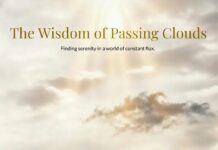Hello, everyone. Welcome to this episode of the podcast provided by the Buddhas’ Practice Incorporated of Australia.
Today, we’ll explore another crucial parable from the Lotus Sutra, from the chapter titled, “The Parable of the Medicinal Herbs.” This text uses a grand yet intricate metaphor to reveal the Buddha’s supreme wisdom and boundless compassion.
1. The Principle of Different Capacities
First, the Buddha declares that he is the King of all Dharma, freely mastering all teachings. Everything he speaks is true and not in the least false, and all his teachings can guide sentient beings to the ultimate shore of omniscience. The Buddha perceives the underlying mental disposition of all beings without obstruction and reveals this wisdom without reservation.
The Buddha is like a great cloud that arises and covers the great manifold cosmos, equally pouring down the sweet Dharma rain. The grasses, trees, and medicinal herbs on the earth, regardless of their size or species, are all equally nourished by the rain.
However, because their innate natures are different, a small-rooted plant absorbs little, a medium-rooted plant absorbs a moderate amount, and a large-rooted plant absorbs much more. Yet, each grows, blossoms, and bears fruit according to its capacity.
The Buddha’s appearance in the world is exactly like this. He declares to the whole world: “I am the Tathagata.” He causes those who have not yet been delivered to be delivered, those who are not yet at ease to be at ease, and those who have not yet attained nirvana to attain it.
The Buddha is the All-Knower, the All-Seer, and the Knower of the Path. He perfectly discerns the minds, thoughts, aspirations, and preferences of all beings. He does not speak a Dharma that beings cannot understand or endure; instead, he speaks according to their capacity, granting them a path that aligns with their nature. This causes those who listen to rejoice and swiftly gain extraordinary benefits, settling in their spiritual practice.
The fundamental purpose of all the Buddha’s teachings is to guide beings to the stage of omniscience. However, after hearing the Dharma, sentient beings receive different results based on the differences in their capacities.
Those who, after hearing the Dharma, settle in good human and heavenly realms or become Wheel-turning Kings and Brahma Kings, are like the small herbs.
Those who, upon hearing the Dharma, understand the incorruptible Dharma, attain nirvana, possess the six transcendent powers, and live alone in mountain forests practicing meditation, attaining the enlightenment of the Pratyekabuddhas—they are like the medium-sized herbs.
And those who vow to become a Buddha and practice with diligent resolve, cultivating great compassion and knowing with unwavering certainty that they will attain Buddhahood—they are like the large herbs and even the small trees.
Furthermore, those great Bodhisattvas who abide in transcendent powers, turn the irreversible wheel of the Dharma, and save countless beings—they are the flourishing large trees.
2. The Return to the One Vehicle
My friends, the Buddha uses all these various parables to reveal the ultimate Buddha Path of the One Vehicle. He teaches beings that this path may seem to have three vehicles, but in reality, there is only one. Regardless of whether beings are small herbs, medium herbs, or large trees, the Dharma rain they absorb is fundamentally of one flavor, leading them toward a single destination: the attainment of Buddhahood.
3. Conclusion
The wisdom of the Tathagata is profound and his teachings are vast and boundless. He uses countless skillful means to patiently guide all sentient beings.
No matter the capacity of beings or where they begin, they will all ultimately return to the One Vehicle of the Buddha Path and achieve Supreme Enlightenment.
Thank you.





